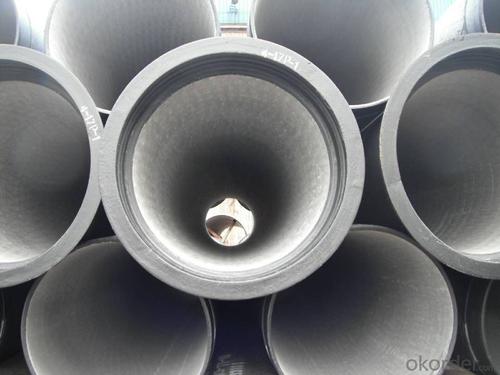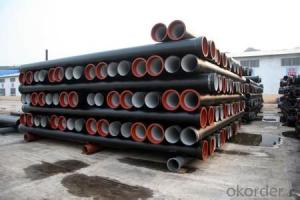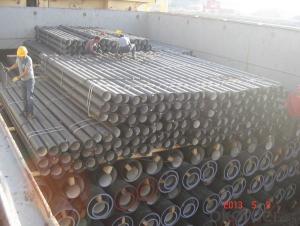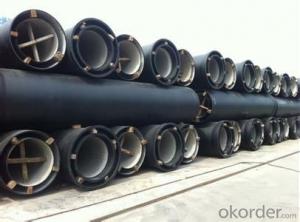DUCTILE IRON PIPE DN125
- Loading Port:
- China Main Port
- Payment Terms:
- TT OR LC
- Min Order Qty:
- -
- Supply Capability:
- -
OKorder Service Pledge
OKorder Financial Service
You Might Also Like
Specification:
1) The standard of pipe: ISO2531:1998, K9
2) Effective length: 6m
3) Inner cement line: Portland cement line as per ISO4179
4) Zinc coating: at least 130g/m2 as per ISO8179
5) Bitumen painting: at least 70um as per ISO8179
6) With 100% quantity of NBR ring, or SBR ring, or EPDM ring as per ISO4633
7) DN80mm-800mm
8) High strength, lighter than grey iron, good corrosion resistance, no furring, small flow resistance, easy fixing, long life tome about 100 yeas
9) Produced by Hangzhou chunfeng machine
10) Checked by automatic inspection equipment
11) Composition:
Chemical composition | |||
Chemical composition | Ductile Cast Iron Pipe (%) | Grey iron pipe (%) | Steel pipe (%) |
C | 3.5-4.0 | 3.2-3.8 | 0.1-0.2 |
Si | 1.9-2.6 | 1.4-2.2 | 0.15-0.4 |
Mn | 0.15-0.45 | 0.4-0.6 | 0.3-0.6 |
P | ≤0.06 | ≤0.3 | 0.02-0.03 |
S | ≤0.02 | ≤0.1 | 0.02-0.03 |
Mg | 0.03-0.06 |
|
|
12) Feature:
Mechanical properties | |||
| Ductile Cast Iron Pipe | Grey Iron Pipe | Steel Pipe |
Tensile Strength(Mpa) | ≥420 | 150-260 | ≥400 |
Yield Strength(Mpa) | ≥300 | No Confirmation | No Confirmation |
Bending Strength(Mpa) | ≥590 | 200-360 | ≥400 |
Elongation (%) | ≥10 | Neglected | ≥18 |
Brinell Hardness(HBS) | ≤230 | ≤230 | About 140 |
13) T type mechanical joint
14) Packing: in bulk or container
- Q: What is the cost of ductile iron pipes compared to other materials?
- The cost of ductile iron pipes is generally higher compared to other materials such as PVC or HDPE. While the upfront cost may be higher, ductile iron pipes are known for their durability, longevity, and resistance to damage, making them a cost-effective choice in the long run.
- Q: Are ductile iron pipes suitable for mining applications?
- Yes, ductile iron pipes are suitable for mining applications. Ductile iron pipes are known for their strength, durability, and resistance to corrosion, making them ideal for underground mining operations. They can withstand high pressure, heavy loads, and abrasive materials commonly found in mining environments. Additionally, their flexible nature allows for easy installation and maintenance in challenging mining conditions.
- Q: Are ductile iron pipes suitable for bridge crossings or crossings under roadways?
- Yes, ductile iron pipes are suitable for bridge crossings or crossings under roadways. They possess high strength and durability, making them capable of withstanding heavy loads and traffic conditions. Additionally, their flexibility and resistance to external pressures make them an ideal choice for such applications, ensuring long-lasting and reliable performance.
- Q: What is the acceptance of cast iron pipe material?
- According to the casting method, it is divided into continuous cast iron pipe and centrifugal cast iron pipe, in which the centrifugal cast iron pipe is divided into sand mould and metal type two kinds. Divided into gray cast iron pipe and nodular cast iron pipe according to different material.
- Q: What are the meanings of cast iron pipe wall thicknesses LA, A and B respectively?
- You are mistaken in concept. The cast iron pipe is the sort of connection method. The ductile iron pipe is classified according to the material.
- Q: Are ductile iron pipes resistant to microbiologically induced corrosion?
- Yes, ductile iron pipes are generally resistant to microbiologically induced corrosion (MIC). Ductile iron is a type of cast iron that has been treated with magnesium to give it increased strength and flexibility. This treatment creates a protective layer on the surface of the iron, making it less susceptible to corrosion caused by microorganisms. MIC occurs when certain types of bacteria, fungi, or other microorganisms interact with the metal surface of pipes and produce corrosive byproducts. However, ductile iron is generally resistant to MIC because the protective layer formed during the manufacturing process acts as a barrier, preventing microorganisms from directly contacting the metal surface. Additionally, ductile iron pipes are often lined with cement mortar or other protective coatings, which further enhance their resistance to corrosion. These linings provide an additional layer of protection against microorganisms, reducing the potential for MIC. Despite these inherent resistance properties, it is important to note that the resistance to MIC can vary depending on the specific conditions and environment in which the pipes are installed. Factors such as water quality, temperature, and the presence of certain microorganisms can influence the susceptibility of ductile iron pipes to MIC. Therefore, it is essential to consider these factors and take appropriate measures to prevent MIC, such as regular monitoring of water quality, proper maintenance, and the use of corrosion inhibitors or biocides when necessary.
- Q: What is the cost of ductile iron pipes compared to other pipe materials?
- The cost of ductile iron pipes can vary depending on various factors such as size, length, and supplier. However, in general, ductile iron pipes tend to be more expensive compared to other pipe materials such as PVC (polyvinyl chloride) or steel. This is mainly due to the manufacturing process and the inherent qualities of ductile iron that make it a durable and reliable choice for various applications. Ductile iron pipes are known for their high tensile strength, resistance to corrosion, and durability, making them suitable for carrying potable water, wastewater, and other fluids under high pressure. The production process of ductile iron involves adding magnesium to cast iron, which results in improved strength and flexibility. This additional process, along with the quality of the material, contributes to the higher cost. On the other hand, pipes made from materials like PVC or steel can be less expensive. PVC pipes are lightweight, easy to install, and relatively inexpensive, making them a popular choice for low-pressure applications such as irrigation or drainage systems. Steel pipes, known for their strength and durability, are often used in high-pressure applications but come at a higher cost than PVC. Ultimately, the cost of ductile iron pipes may be higher initially, but their longer lifespan and reliability can offset the investment over time. Additionally, factors such as the specific project requirements, local regulations, and availability of materials can also influence the overall cost comparison between ductile iron pipes and other pipe materials.
- Q: What is the typical wall thickness of ductile iron pipes?
- The wall thickness of ductile iron pipes can vary depending on their size and intended use, with a typical range of 0.25 inches (6.35 mm) to 0.5 inches (12.7 mm). However, when dealing with larger diameter pipes or those meant for high-pressure applications, the wall thickness may exceed these measurements. To determine the suitable wall thickness for a ductile iron pipe, it is crucial to refer to industry standards and project specifications.
- Q: Can ductile iron pipes be used for underground sewage systems?
- Yes, ductile iron pipes can be used for underground sewage systems. Ductile iron is a type of cast iron that has enhanced flexibility and strength, making it suitable for various applications, including sewage systems. Ductile iron pipes offer several advantages for underground sewage systems. Firstly, they have excellent corrosion resistance, which is crucial in sewage systems where the presence of moisture and chemicals can cause corrosion over time. This resistance to corrosion ensures the long-term durability and reliability of the pipes. Secondly, ductile iron pipes have high tensile strength, allowing them to withstand the pressure and stress that can occur in underground sewage systems. They are resistant to ground movements, such as soil settling or shifting, which can cause damage to other types of pipes. Furthermore, ductile iron pipes have a smooth internal surface, which results in a better flow capacity and reduces the likelihood of clogging or blockages in the sewage system. This smooth surface also helps to minimize the accumulation of debris and sediment, reducing the need for frequent maintenance and cleaning. Another important factor is that ductile iron pipes are available in various sizes and can easily be connected using a range of joint systems, allowing for flexibility in designing and constructing underground sewage systems. In summary, ductile iron pipes are an excellent choice for underground sewage systems due to their corrosion resistance, high tensile strength, smooth internal surface, and ease of installation.
- Q: Can ductile iron pipe be used for power plant cooling water systems?
- Indeed, power plant cooling water systems may utilize ductile iron pipe. Ductile iron pipe possesses remarkable strength and longevity, rendering it appropriate for diverse applications, including cooling water systems in power plants. Its superb corrosion resistance shields it against the deleterious impacts of water and chemicals frequently present in such systems. Moreover, the smooth interior surface of ductile iron pipe reduces friction loss and enables efficient water flow. These attributes establish ductile iron pipe as a dependable and economical option for power plant cooling water systems.
Send your message to us
DUCTILE IRON PIPE DN125
- Loading Port:
- China Main Port
- Payment Terms:
- TT OR LC
- Min Order Qty:
- -
- Supply Capability:
- -
OKorder Service Pledge
OKorder Financial Service
Similar products
Hot products
Hot Searches
Related keywords




























